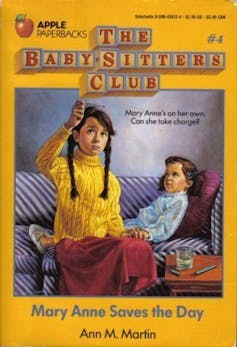Millie Bobby Brown's debut novel is a bestseller. Does it matter that the 19-year-old actor didn't write it?
- Written by Amber Gwynne, Sessional Lecturer in Writing, The University of Queensland

Stranger Things actor Millie Bobby Brown’s debut novel, Nineteen Steps[1], revolves loosely around true events. In 1943, the Bethnal Green tube disaster[2] claimed the lives of 173 Londoners, due to faulty stairs in the station used as an air raid shelter.
This tragedy, the UK’s largest loss of civilian life in the second world war, was one Brown’s own grandmother survived. Brown describes her novel as a “really special project[3]” inspired by her family’s WWII history.
But she didn’t write Nineteen Steps. A ghostwriter named Kathleen McGurl[4] did. McGurl described the process in a blog post[5]:
I was sent a lot of research that had already been pulled together by Millie and her family, and plenty of ideas, and we had a couple of Zoom calls. And then I knuckled down and wrote the first draft, while Millie continued sending more ideas via WhatsApp. The book went through several drafts since then, as we refined the story.
There’s been vocal backlash[6] against the book – partly due to Brown’s outsourcing, but also for its quality. The novel’s first paragraph, which has been shared widely (and derisively) on social media, ends with the line:
I read Millie Bobby Brown’s book so you don’t have to.It was hot — the kind of heat that makes you long for the weather to cool down and the leaves to fall, but then you berated yourself for wishing away the good weather.
Social media users have further lambasted the dubious origins and quality of Nineteen Steps by posting screenshots[7] from classic novels, cheekily attributing the opening lines to Brown.
Read more: Ghostwriters haunt our illusions about solitary authors[8]
Credit where credit’s due?
Ghostwritten novels have long haunted debates surrounding issues of authorship and authenticity[9] in publishing.
It’s a phenomenon we seem to tolerate in some genres, usually when the real author’s ghostly presence is an open secret (even subtly acknowledged), or when authorship takes a backseat to story. It’s more common in mass-market than literary fiction.

















